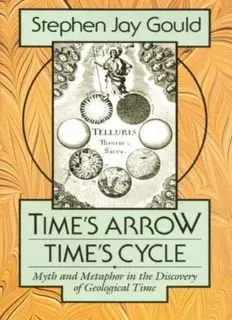
STEPHEN JAY GOULD - systematicbiology.co.nf PDF
Preview STEPHEN JAY GOULD - systematicbiology.co.nf
STEPHEN JAY GOULD TIME'S ARROW, TIME'S CYCLE Myth and Metaphor in the Discovery of Geological Time THE JERUSALEM-HARVARD LECTURES Sponsored by the Hebrew University of Jerusalem and Harvard University Press TIME'S ARROW TIME'S CYCLE Myth and Metaphor in the Discovery of Geological Time STEPHEN JAY GOULD HARVARD UNIVERSITY PRESS Cambridge, Massachusetts and London, England Copyright © 1987 by the President and Fellows of Harvard College All rights reserved Printed in the United States of America Ninth printing, 1996 Set in Linotron Galliard and designed by Marianne Perlak Library of Congress Cataloging-in-Publication Data Gould, Stephen Jay. Time's arrow, time's cycle. (The Jerusalem-Harvard lectures) Bibliography: p. Includes index. 1. Geological time—Study and teaching—History. 2. Burnet, Thomas, 1635?–1715. Telluris theoria sacra. 3. Hutton, James, 1726–1797. Theory of the earth. 4. Lyell, Charles, Sir, 1797–1875.I. Tide. II. Series. ′ ′ QE508.G68 1987 551.7 01 09 86-29485 ISBN 0–674–89198–8 (alk. paper) (cloth) ISBN 0–674–89199–6 (paper) For RICHARD WILSON, M.D. KAREN ANTMAN, M.D. Sine quibus non In the most brutal, literal sense. Acknowledgments The genesis of this book lies in the same conflict and interaction of metaphors— arrows of history and cycles of immanence—that fueled the discovery of deep time in geology. If I have succeeded in conveying the intended order of my thoughts, this book may strike readers as forged to some unity in a rational manner—as a product, in other words, of immanent structure reflected in the metaphor of time's cycle. But such a view, while reflecting (I hope) the logic of construction, would grossly misrepresent the psychologic of origin, for this volume is cobbled together from bits and pieces of time's arrow, quirky and unpredictable moments of my own contingent history. Tiny events that seemed meaningless at the time are horseshoe nails in the final structure. I cannot begin to specify all these incidents of "just history." My father took me to see a Tyrannosaurus when I was five. George White, great gentleman and bibliophile, gave me a seventeenth-century edition of Burnet's Tdluris theoria sacra in lieu of an honorarium for a talk. John Lounsbury illustrated uniformitarianism by an example that conflated distinct meanings during an introductory course in geology at Antioch College. I knew that something was wrong, but didn't understand what, until I studied David Hume on induction. I visited the Portrush Sill in Northern Ireland on a spring field course at the University of Leeds (during an undergraduate year abroad), and saw the dichotomy of neptunism and plutonism etched in rocks. I stood in mixed horror and fascination before the skeleton(s) of Ritta-Christina, the Siamese twin girls of Sardinia, in a Paris museum. I perceived Burnet's frontispiece in the glittering beauty of viii Acknowledgments James Hampton's Throne for Christ's second coming at the Na- tional Museum of American Art. I listened to Malcolm Miller, self- appointed sage of Chartres, reading medieval metaphors in glass and statuary. R. K. Merton then showed me what a vainglorious fool I had been in thinking I had discovered the origin of Newton's phrase about the shoulders of giants in the south transept of that greatest among cathedrals. I owe a more profound and immediate debt to colleagues who have struggled to understand the history of geology. I present this book as a logical analysis of three great documents, but it is really a collective enterprise. I am embarrassed that I cannot now sort out and properly attribute the bits and pieces forged together here. I am too close to this subject. I have taught the discovery of time for twenty years, and have read the three documents over and over again (for I regard such repetition as the best measuring stick of an intellectual life-when new insights cease, move on to something else). I simply do not remember which pieces came from my own readings of Burnet, Hutton, and Lyell, and which from Hooykaas, or Rudwick, Porter, or a host of other thinkers who have inspired me-as if exogeny and endogeny could form separate categories in any case! In the most immediate sense, I owe great thanks to Don Patinkin, of Hebrew University, Jerusalem-and to Eitan Chernov, Danny Cohen, and Rafi Falk, guides and friends during my visit. This book is a greatly elaborated and reworked version of the first series of Harvard-Jerusalem lectures, presented at Hebrew University in April 1985. Arthur Rosenthal, director of Harvard University Press, conceived this series and brought it to fruition-and to him as godfather my deepest thanks. I can only hope that I have set a worthy beginning to a series that, by time's arrow of progress, will soon supersede its inception (while I hope for some remembrance in time's cycle of memory). As for Jerusalem, the truly eternal city, I can only say that I finally understand Psalm 137: "If I do not remember thee, let my tongue cleave to the roof of my mouth; if I prefer not Jerusalem above my chief joy." Now that's quite a tribute from a man who lives by lecturing! Contents 1. The Discovery of Deep Time 1 Deep Time 1 Myths of Deep Time 3 On Dichotomy 8 Time's Arrow and Time's Cycle 10 Caveats 16 2. Thomas Burners Battleground of Time 21 Burnet's Frontispiece 21 The Burnet of Textbooks 23 Science versus Religion? 24 Burnet's Methodology 26 The Physics of History 30 Time's Arrow, Time's Cycle: Conflict and Resolution 41 Burnet and Steno as Intellectual Partners in the Light of Time's Arrow and Time's Cycle 51 3. James Hutton's Theory of the Earth: A Machine without a History 61 Picturing the Abyss of Time 61 Hutton's World Machine and the Provision of Deep Time 63 The Hutton of Legend 66 Hutton Disproves His Legend 70 The Sources of Necessary Cyclicity 73 Hutton's Paradox: Or, Why the Discoverer of Deep Time Denied History 80 Borges's Dilemma and Hutton's Motto 92 Playfair: A Boswell with a Difference 93 A Word in Conclusion and Prospect 96
